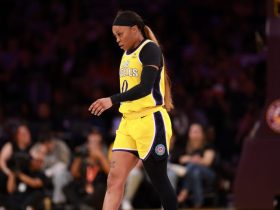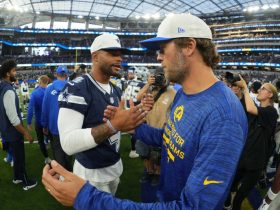The liberal activist Ralph Nader still remembers nearly the exact words Joe Biden used to banish him from the U.S. Senate 23 years ago, after Nader’s Green Party presidential bid in 2000 won 97,000 votes in Florida.
“Ralph Nader is not going to be welcome anywhere near the corridors,” then-senator Biden had declared, blaming the consumer advocate for Democrat Al Gore’s defeat to Republican George W. Bush.
So began Nader’s long exile from Democratic Capitol Hill hideaways, where Nader had once been feted as a conquering policy genius. Nader, a spry 89-year-old who works remotely because of covid concerns, still resents the slight. But if you ask him these days about Biden’s reelection fight in 2024, he does not respond with his old gibes about Republicans and Democrats being nothing more than “Tweedledum and Tweedledee.”
“We are stuck with Biden now,” Nader says in his cantankerous way. “In a two-party duopoly, if one should be defeated ferociously, the logic is that the other one prevails.”
Former president Donald Trump is, of course, the one deserving ferocious defeat in that calculation, and for the moment Nader wants everyone to know that this has become his overriding political mission.
“I know the difference between fascism and autocracy, and I’ll take autocracy any time,” Nader said in a recent telephone interview. “Fascism is what the GOP is the architecture of, and autocracy is what the Democrats are practitioners of. But autocracy leaves an opening. They don’t suppress votes. They don’t suppress free speech.”
If the pivot matters, it is likely to land hardest among the dissident parts of the liberal coalition, who like him have been fed up for years with the state of Democratic politics and could once again play a major role if they stay home or vote third-party in a close general election. Nader is dismissive of the chances of the Green Party in 2024, despite personal praise for Cornel West, the party’s likely candidate. He speaks of Robert F. Kennedy Jr., a Democratic challenger to Biden who campaigns on some of Nader’s issues, as a wayward talent unable to get out of his own way.
Nader says no formal Biden endorsement will be forthcoming, and he still supports the idea of third parties in principle. “Biden is better than he has ever been but he is still terrible on empire and Wall Street,” is about as close as he will come to complimenting the president. But the cover boy for Newsweek in 1968 and Time in 1969 has devoted himself as he approaches his tenth decade of life to, in his view, making Democrats better at being Democrats.
For months, he has been calling and snail-mailing elected officials and operatives his thoughts about how the party must improve its sales pitches. He produced a 10-point plan for improving the party’s messaging and campaign tactics last year, calling for harder punches at the GOP and more liberal policy solutions.
The response has been mostly nothing — unreturned calls he counts in the thousands, a result of resentments over his 2000, 2004 and 2008 third-party presidential campaigns. Even news outlets that used to cover his crusades have moved on. “The main press I get these days is the obituary columns,” he jokes.
But he still reads the major papers carefully every day and likes to track down the phone numbers of Democratic knife fighters he feels are wielding dull blades.
“He called me to tell me my quote wasn’t good enough,” explained one young Democratic operative, who spoke on the condition of anonymity to describe a recent upbraiding out of the blue. “He was going to send me a bunch of materials he wanted me to read and asked for my address.”
Close friends of Nader, a group that includes committed Democrats, have noted an unmistakable shift.
“Ralph is in a different place because America is in a different place,” said Mark Green, the former Democratic New York City public advocate. “This stage is stopping a life-ending comet like the one that stopped the dinosaurs. He says this is an existential fight and he is going to marshal whatever he has to stop Trump and Trumpism.”
In practice, that means talking down the liberal challenges Biden may face in a general election.
“Bobby Kennedy gives a good portion of his speech on corporate power. And it couldn’t be better,” Nader said of the Democratic challenger to Biden, who has recently opened the door to launching a late third-party bid. “But then he has this bizarre tick on vaccines and Ashkenazi Jews,” a reference to Kennedy’s recent suggestion that covid-19 was “ethnically targeted” in a way that spared some Jews. (Kennedy later said he was not suggesting humans had deliberately engineered the virus with that goal.)
“His advisers should tell him, ‘Why do you keep raising these crazy things?’” Nader continued. “That’s the tragedy of his campaign. He can’t resist raising new bizarre correlations-as-causation and all that stuff.”
Kennedy’s campaign manager, former Ohio congressman Dennis Kucinich, responded by calling Nader “one of my heroes.”
“I’ll take the first part about what he said as an endorsement,” Kucinich said lightly, knowing it was not. “I’ll take the second part of what he said as a message from a friend.”
West’s campaign manager, Peter Daou, now sings from a playbook that Nader pioneered. “For too long, we’ve been told the only options are red and blue,” Daou says. “It is time we practice democracy rather than just pay it lip service.”
But Nader no longer joins in.
“Cornel West has the most complete progressive agenda. It almost doesn’t have any progressive aberrations,” Nader said. “The problem is that the Greens are not that organized. It is hardly a secret. And you can’t run a presidential campaign if you don’t have local candidates and some kind of organization round the country.”
That’s a striking thing to hear from the man who used to respond in 2000 to Democratic concerns that he was a spoiler by saying, “Both parties must feel the heat.”
“Did I learn the lesson that this was an ironclad two-party duopoly absent a farmers-level, progressive 1887 movement? Yeah. Yeah, I learned it,” he said of the 19th Century populist reaction to the shifting agricultural economy that came with railroad expansion.
As for getting his calls returned from the Biden White House or campaign, he remains pessimistic but undaunted. He still remembers being one of the first advocates to meet with Biden in 1973, back when Nader was still flying high from his crusades for auto regulations and reforms of the Federal Trade Commission. He says their relationship fell out over the Robert Bork hearings in 1987. The final break came days after the 2000 election.
”Nader cost us the election,” Biden told the New York Times.
Nader’s power to influence laws quickly eroded, and the groups he had founded, like Public Citizen, soon found themselves eclipsed as idea generators by new operations such as the Center for American Progress, which were built up by advisers to subsequent Democratic nominees like Barack Obama and Hillary Clinton.
True to form, Nader refused to accept his punishment. He remains offended by the accusation that he cost Democrats the 2000 election in Florida. He similarly scoffs at the claims that Green Party candidate Jill Stein hurt Hillary Clinton in 2016.
“They have no idea of all the other sine qua non variables,” he says, using Latin to refer to other Democratic failures that factor in their two defeats.
And he still brims with the sort of advice most Democrats consider heresy, when spoken publicly. For instance, he says Democrats need a better plan in case something happens over the next year to prevent Biden from standing for reelection. He considers Vice President Harris “just not capable” and all but certain to lose in a general.
“Things happen rapidly in the 80′s unfortunately to human beings, so they need to have a Plan B in case something happens,” he said of Biden, who is nearly nine years his junior.
The Biden campaign did not respond to a request for comment.








